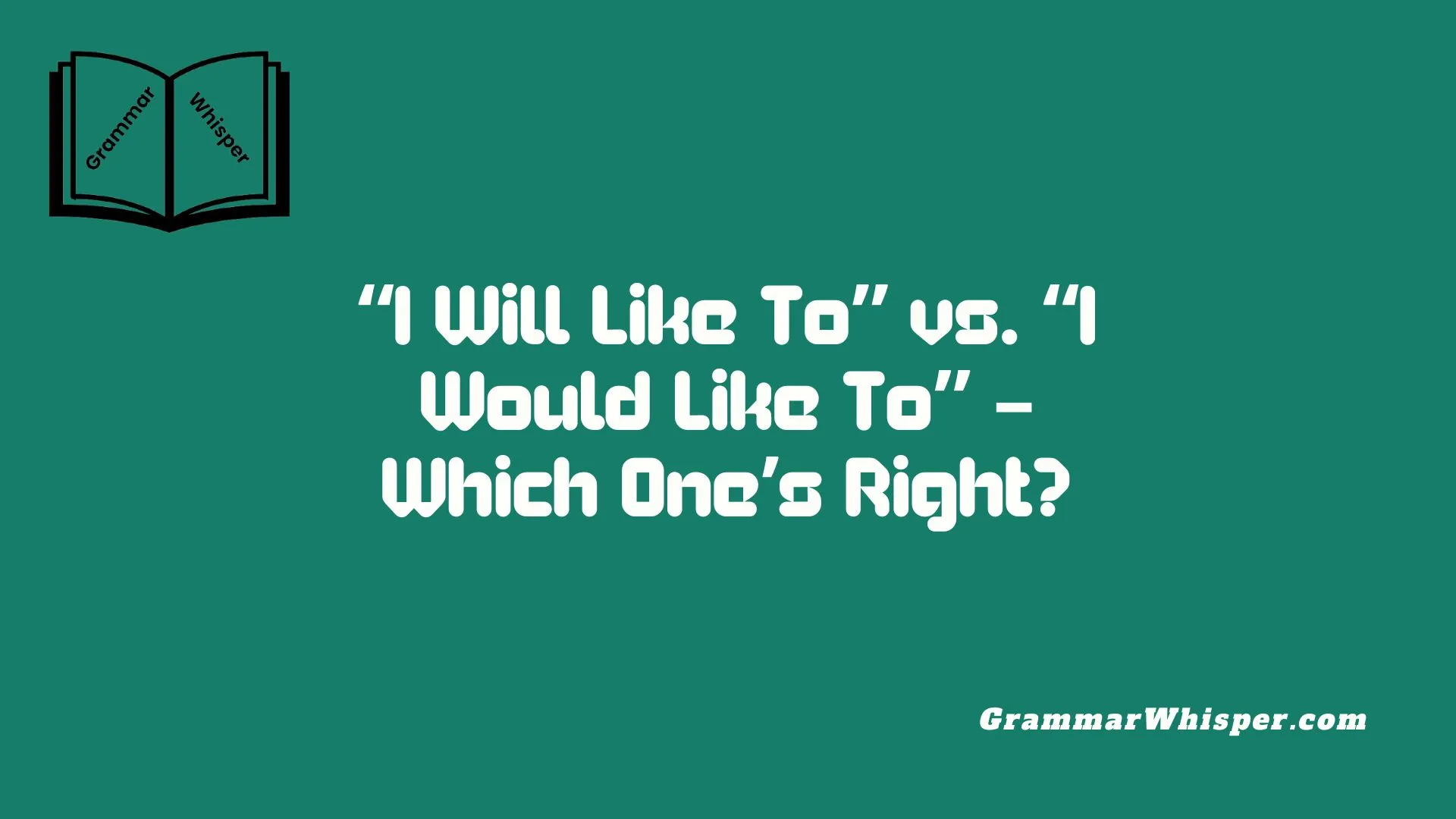I still remember the first time I casually used “I will like to” during a presentation. The room went quiet – not in a good way. That moment sparked my journey into the grammar, tone, and nuance behind how we express ourselves in English. What I learned is that it’s not just about correct usage – it’s about being aware of timing, politeness, and social cues. Over time, phrases like “I would like to ask a question” became second nature to me. They didn’t just sound more appropriate in formal situations – they made me feel more confident and helped me sound more fluent. And that’s when I began uncovering deeper grammatical insights that had never been taught in textbooks.
The real difference between these two phrases comes down to intent and cultural context. Native speakers don’t just say things because they’re technically correct – they say them to sound polite and natural. Through hundreds of real-life examples, I’ve seen how a slight shift in phrasing changes how your speech is received. I spent years polishing my expressions, fine-tuning my communication skills, and slowly building a complete understanding of how English really works in the real world. These aren’t just language lessons – they’re life skills.
Quick Grammar Refresher: “Will” vs. “Would”
English is full of subtle shades. And modal verbs like will and would are where things often trip up learners – and even native speakers.
| Modal Verb | Function | Tone/Usage |
| Will | Future intention, certainty | Direct, assertive, sometimes too strong |
| Would | Hypothetical, polite request | Indirect, courteous, preferred in speech |
“Will” is used for definite future actions:
I will go to the store.
“Would” is often used for preferences, requests, or polite intentions:
I would like to speak with the manager.
Why “I Will Like To” Is Almost Always Incorrect
The phrase “I will like to” may sound logical when you’re translating from another language, but in natural English, it’s rarely appropriate.
Let’s break it down.
❌ The Problem with “I Will Like To”
When you say “I will like to,” you’re combining:
- “will” = future tense modal
- “like” = a present tense verb describing preference
That’s a mismatch. You’re essentially saying: In the future, I will feel a liking for doing something. That’s not how English works in this context.
✅ How Native Speakers Say It Instead
- Correct: I would like to ask a question.
- Incorrect: I will like to ask a question.
The first one is smooth and expected in conversation. The second one feels clunky and unnatural.
Is “I Will Like To” Ever Correct?
Surprisingly, yes – but only in a very specific context.
If you’re referring to a future emotional reaction, then “will like” might make sense:
I think I will like the movie once I see it.
Here, you’re predicting your future feeling – and that’s grammatically sound.
✔ Correct Usage Example:
You will like this place. It’s beautiful!
But in phrases like “I will like to speak with you,” that future emotion logic breaks down. You’re not predicting whether you’ll enjoy speaking – you’re expressing a desire to do so. And for that, “would like to” is the right phrase.
“I Would Like To” – The Correct, Polite Way to Express Desire
If you want to sound natural, respectful, and grammatically correct, use “I would like to.”
This phrase is a polite and indirect way to express desire or preference.
Why “Would Like To” Works:
- It softens the request
- It’s widely used in formal and informal contexts
- It shows intention without forcefulness
Real-World Examples:
| Scenario | Correct Phrase |
| Business Email | I would like to schedule a meeting. |
| Customer Interaction | I would like to speak to a manager. |
| Formal Conversation | I would like to apply for the role. |
| Friendly Tone | I’d like to grab coffee later. |
Politeness vs. Assertiveness: Tone in English
English often values politeness through indirectness. That’s why “I would like to” is more common than “I will like to.”
Here’s a side-by-side breakdown of tone:
| Phrase | Tone | Perception |
| I will like to… | Direct, awkward | Blunt, possibly unnatural |
| I would like to… | Polite, smooth | Respectful, professional |
| I want to… | Neutral to strong | Casual or slightly forceful |
| I’d like to… | Friendly | Polite, slightly less formal |
Why Native Speakers Instinctively Use “Would Like To”
If you’re aiming for native-like fluency, here’s the truth:
Native speakers don’t say “I will like to…” when making a request or offering something.
They instinctively reach for “I’d like to” or “I would like to” because it sounds softer, more familiar, and more emotionally intelligent.
Let’s look at some corpus data:
🔍 Real Usage Data (COCA – Corpus of Contemporary American English)
| Phrase | Occurrences |
| “I would like to” | 12,300+ |
| “I will like to” | Less than 20 |
That’s not just preference. That’s dominance.
Where Learners Go Wrong – Common Mistakes with “Will” and “Would”
Mistake 1: Assuming “will” = politeness
Wrong: I will like to speak with your boss. Right: I would like to speak with your boss.
Mistake 2: Direct translation from another language
Many languages use the future tense differently. In French or Spanish, a literal translation might produce “I will like,” but English uses conditionals for politeness.
Mistake 3: Not recognizing tone differences
Learning English isn’t just about grammar – it’s about how you come across. Tone matters.
Real-Life Usage Scenarios: Make Your English Polished
Here’s how you can apply the correct version in real-world settings:
🔹 Business Context
- Email: I would like to follow up on our last conversation.
- Presentation: I would like to propose a new strategy.
🔹 Interviews & Applications
- I would like to express my interest in this position.
- I would like to discuss my qualifications further.
🔹 Customer Service
- I would like to return this item.
- I would like to speak with your manager.
🔹 Social Settings
- I’d like to meet up next week.
- I’d like to order the pasta, please.
How Modality Affects “Will” vs. “Would”
Understanding modality in English helps explain this even further.
What’s Modality?
Modality refers to the attitude or intent behind the verb.
| Modal | Function |
| Will | Strong intent, certainty |
| Would | Softened tone, hypothetical, polite |
In the phrase “I would like to,” the modal “would” suggests that your desire is polite, not pushy.
Formal vs. Informal Choices
How do these expressions stack up in tone and appropriateness?
| Phrase | Formality Level | Best For |
| I would like to | Very Formal | Interviews, emails, business requests |
| I’d like to | Semi-Formal/Friendly | Daily conversations, casual meetings |
| I want to | Neutral or Informal | Friends, personal statements |
| I will like to | Rare, often incorrect | Only when predicting future emotions |
Cultural Context: Why “Would Like To” Wins Globally
Across the English-speaking world – from the US to the UK, Canada to Australia – the preference remains consistent:
“I would like to” is the gold standard for polite expression.
In American English, especially, indirectness is a form of courtesy. In British English, it’s often non-negotiable in formal writing. In other cultures, directness might be preferred – but for English learners, it’s important to understand the dominant convention.
Audience Awareness: Who You’re Talking To Matters
Tailoring your language to your audience boosts clarity and professionalism.
Adjust Your Tone Based On:
- Context: Business, casual, personal
- Relationship: Stranger vs. friend
- Purpose: Request, offer, complaint
Example Shifts:
| Audience | Phrase To Use |
| Job Interview | I would like to express my interest |
| Friend | I’d like to grab lunch sometime |
| Complaint Line | I would like to file a report |
Practical Exercises to Master “Would Like To”
Want to sound more natural in conversation? Practice is key.
Rewrite These:
- ❌ I will like to order pizza. ✅ I would like to order pizza.
- ❌ I will like to meet you tomorrow. ✅ I would like to meet you tomorrow.
- ❌ I will like to apply for this job. ✅ I would like to apply for this job.
Try These Prompts:
- Write an email where you ask to schedule a call.
- Make a polite request to a professor or supervisor.
- Roleplay a customer asking for a refund.
Final Thoughts
Let’s wrap up the most important points:
“I would like to” is correct for almost every situation involving a request, desire, or offer. “I will like to” is grammatically awkward and almost never used by native speakers. Use “would” for tone, politeness, and natural fluency. Think about who you’re talking to and what you’re asking for. Adjust accordingly.
FAQs
Is “I will like to” ever acceptable?
Only when you’re predicting a future emotional response: I think I will like this restaurant.
Can I use “want to” instead?
Yes, but it’s more direct and less polite. Use with care:
I want to leave now (direct). I would like to leave now (polite).
What about “would love to”?
It’s more enthusiastic:
I would love to join you! Still correct, but more informal than “would like to.”











